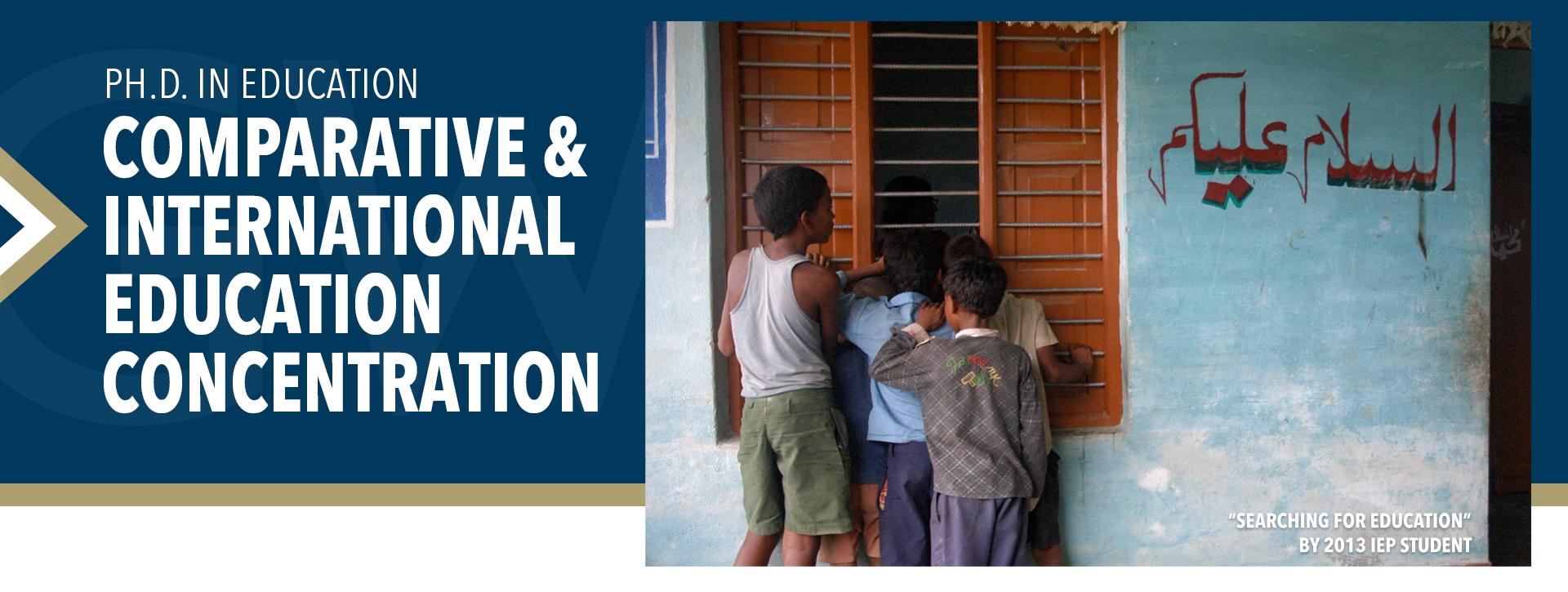A Day in the Life of a PhD Student
Hear from three education doctoral students about their day-to-day experience as a PhD student and their advice for those considering a PhD program.


The Comparative and International Education PhD concentration examines education in global contexts. Education is viewed as a way to develop the capabilities of individuals, communities, nations, and the world, and to build institutions that support educational improvement and the common good. Faculty research focuses on issues of migration, forced displacement and refugees, under-developed capacities of historically marginalized groups, education for global competence and global citizenship, international higher and K-12 education, and the complexities of action at local, nation, and global levels.

International Perspectives
Engage in active learning opportunities to confront challenges in education globally through linkages with international communities within and outside the United States.
Hands-On Experiential Learning
Take part in our larger inclusive cross-disciplinary team as well as a more focused research project. You’ll bring your experience in education to the design, development, data collection, and analyses of a research project.
Principles of Research
Gain a deeper understanding of designing and conducting ethical and culturally relevant research with human subjects and considering the social impact of the work.
As a Carnegie R1 institution (very high research activity), the George Washington University is home to world-class faculty that are leading cutting-edge research, along with diverse research labs, cross-collaborative initiatives between schools and local organizations, and unparalleled educational and employment opportunities.
Benefit by examining education reform in the policymaking capital of the world, plus gain a wealth of hands-on experiential learning opportunities at nearby diverse school settings.
Doctor of Philosophy (PhD) in Education, Comparative and International Education Concentration
Foggy Bottom Campus
Fall

The aims of the PhD are to:
The following requirements must be fulfilled: 60 credits, including 36 credits in core courses, and 24 credits in the concentration, successful completion of a research project, successful completion of the comprehensive examination; oral defense of both the dissertation proposal and the dissertation.
| Code | Title |
|---|---|
| Required | |
| Core Courses: | |
| SEHD 8200 | Foundations of Education I |
| SEHD 8201 | Foundations of Education II |
| SEHD 8210 | Doctor of Philosophy Seminar in Education Research I |
| SEHD 8211 | Doctor of Philosophy Seminar in Education Research II |
| Research Methods: | |
| 12 credits of doctoral-level research methods coursework, selected in consultation with advisor. At least one course must be in quantitative research methods and one in qualitative research methods. | |
| Dissertation: | |
| SEHD 8999 | Dissertation Research (taken for at least 12 credits) |
| Additional Requirements: | |
| Successful completion of a research project. | |
| Successful completion of the comprehensive examination. | |
| Oral defense of both the dissertation proposal and the dissertation. | |
| Code | Title |
|---|---|
| Comparative and International Education Concentration Requirements: | |
| SEHD 8100 | Special Topics (Social Theory in Comparative and International Education) |
| SEHD 8100 | Special Topics (Research in International/Intercultural Contexts) |
| 18 additional credits in graduate-level courses determined in consultation with the advisor. Course selections are determined by the focus of the concentration and the specific interests of the student. | |
Students will work to answer questions such as:
GSEHD’s Office of Admissions invites you to apply for a spot in our program. Please review the following admission and financial information.
Ready to take the next step in your career? Review our step-by-step guide to applying to GSEHD >
To learn more about the program, admission process, and upcoming events, please connect with the GSEHD Admissions Team at docinfo![]() gwu [dot] edu (docinfo[at]gwu[dot]edu) or 202-994-9283.
gwu [dot] edu (docinfo[at]gwu[dot]edu) or 202-994-9283.
| Apply Now | Schedule Meeting with Admissions Coach |
To be considered for admission, applicants must submit the online application form as well as the following required supporting documents. There is no application fee.
Please note: The GRE is not required.
*Additional application requirements may exist for international applicants.
The deadline for Fall 2026 admissions has passed. For more information or to inquire about the next admissions cycle, contact the GSEHD Admissions Team at docinfo![]() gwu [dot] edu (docinfo[at]gwu[dot]edu) or 202-994-9283.
gwu [dot] edu (docinfo[at]gwu[dot]edu) or 202-994-9283.
| Application Timeline | Fall |
|---|---|
| Priority Deadline | Nov 1 |
| Round 1 Deadline | Dec 1 |
| Round 2 Deadline | Jan 15 |
We know embarking upon graduate school is a big decision - due in part to the costs of attending. At GW, we understand the time and thought behind making graduate school work for you. Please take a moment to learn more about the options and opportunities available to help fund your graduate education.
Graduate tuition is charged per credit hour, unless otherwise noted. Rates vary by program and location.
The tuition rate for the PhD in Education - Comparative and International Education Concentration program is $1,960 per credit hour.
This program requires 60 credits.
Please note: Additional fees may apply for international students, late fees, etc. Current tuition rates may be updated during the year.
*Summer 2025, Fall 2025 and Spring 2026
Scholarships are available to eligible admitted students. Review eligibility requirements and learn more about funding your education >


My academic pursuit has become clearer: To ensure equitable and quality education for children in urban slums and children with refugee backgrounds. Such pursuit and endeavor of mine were driven by my advisor, faculty members, and colleagues/classmates, who are my dream team continuing to motivate me to stride forward with confidence, perseverance, and will.
InJung Cho
Current Student, PhD in Education, Comparative and International Education Concentration
A PhD in Education with a concentration in Comparative and International Education opens up various career opportunities in the field of education, research, policy analysis, and international development.

Examples of potential career paths include:





A Day in the Life of a PhD Student
Hear from three education doctoral students about their day-to-day experience as a PhD student and their advice for those considering a PhD program.

PhD Candidate Injung Cho Selected as Grad Student Associate at GW Sigur Center for Asian Studies
PhD candidate Injung Cho (Comparative & International Ed) was selected as a Graduate Student Associate (GSA) at the GW Sigur Center for Asian Studies.
“Enhancing System Support for Teacher Well-Being & Retention in Sub-Saharan Africa: Towards a Collaborative Research Agenda” to be led by Drs. Engel and Cha.
Beyond the Buzzwords: How DC Education Policies Shape Youth Activism
Dr. Vanessa Sperduti, Dr. Laura Engel,doc student Sumeyye Arpaci, and international colleagues published in the International Journal of Educational Research.

Dr. Engel, Ph.D. candidate Injung Cho, and Dr. Cha co-authored a book chapter titled, "Revising Case Studies in CIE: Mobilities of Policy, People, and Power."
